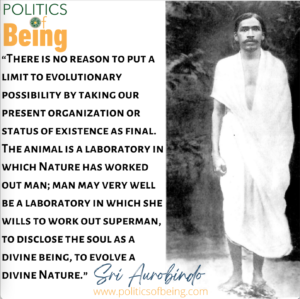
Sri Aurobindo and the Integral Transformation of Societies
From the book chapter: An Evolutive Crisis
The second spiritual teacher to announce the spiritual evolution of humankind was the Indian political leader, poet, and evolutionary philosopher Sri Aurobindo. Born in Calcutta, India, in 1872, he moved to England at the age of seven and lived there fourteen years. He studied at Cambridge, where he gained extensive knowledge of European history and cultures. He was briefly one of the top Indian nationalist political leaders, ending up in jail and close to execution before he dedicated himself to his spiritual work and writings. Based on the Indian spiritual tradition, Aurobindo built a synthesis of different spiritual paths (“yogas”) he called “integral yoga.” This yoga does not aim at spiritual realization as a divine escape from human life and material experience— something Aurobindo critiqued in other practices. Rather, it seeks to constantly ascend to the divine and bring this down to transform one’s human condition—mind, life, and body—thus setting the basis for acollective transformation on Earth.
Indeed, Sri Aurobindo believed that humankind, whose distinctive type of consciousness is mental, is not the last rung in the evolutionary scale and is bound to spiritually evolve to a higher state of existence that he called the “supramental.” He said:
There is therefore no reason to put a limit to evolutionary possibility by taking our present organization or status of existence as final. The animal is a laboratory in which Nature has worked out man; man may very well be a laboratory in which she wills to work outsuperman, to disclose the soul as a divine being, to evolve a divine nature.
Politics and spirituality, Western thinking (especially evolutionary theories), and Eastern spirituality converge in Aurobindo’s vision of human progress. In one of his books, he applied the traditional yogic view of inner development and self-realization as the main driver and ultimate goal of man’s experience on Earth through the reincarnation cycle to understand societies’ evolution and development. According to him, societies are not only composed of human beings, but are beings in themselves (“national souls”) in search of their realization, whose development obeys the same spiritual laws.
Sri Aurobindo refers to the traditional Indian conception of humans, also found in other civilizations, such as ancient Greece, as composed of and governed by different levels of being—physical, “vital” (life force made of emotions, passions, desires, likes and dislikes, etc. that other systems would call the emotional being), mental, and psychic (or soul). Each of these forces is associated with specific questions, attitudes, and patterns of conduct. They coexist within each human and society. Inner development or the process of civilization is one in which humans and societies learn to govern their lives from higher levels of consciousness, putting at their center either the spirit or the highest cultural ideals of truth, beauty, and good cultivated through science, art, and ethics. To endure, the process of civilization needs to embrace the majority of people, otherwise it is “always in danger of submergence by the ignorant night from below.”
The satisfaction of physical, vital, and even mental needs carries “man no more than a certain distance; afterwards he flags and tires for want of a real self-finding, a satisfying aim for his action and progress. These three things do not make the sum of a complete manhood; they are means to an ulterior end and cannot be made forever an aim in themselves.” This pursuit leads ultimately to either deception, loss of vitality, or disaster. Only the spirit can be a safe guiding light and its realization a satisfying aim. The mental consciousness that characterizes human beings does not have the capacity to transform our lower animal nature of the physical and vital consciousness. When it does not subject itself to them, it can only try to subdue them. Societies then lose their vitality and decline.
Sri Aurobindo explained some of the great civilizations’ achievements and failures by the economy, development, and interplay of these inner forces, which spiritual seekers learn to know, organize, and progressively harness on their paths towards self-realization. Ancient Athens, for example, initially concentrated on the “beauty and the delight of living” and later on emphasized philosophy, but lacked the self-discipline and character—both signs of ethical development—to successfully translate these into practice and sustain the city’s flourishing. The ethical impulse behind Republican Rome led it to an exceptional development of selfmastery, which allowed it to conquer and rule a vast territory. But this unnatural repression of life forces ultimately led to revolt, and the “early Roman type collapsed into the egoistic and often orgiastic license of later republican and imperial Rome.”
Other cultures, dominated by ascetic religions and the denial of humanity’s material and vital nature, ultimately discourage the life force they channel, thus stagnating and degenerating. That was the case in India when illusionism (or mâyâvâdâ) prevailed—a doctrine first taught by Shankarâchârya (788–820 AD) that teaches that the universe is an illusion and the only reality is the unmanifested divine, Brahman.
Reason, whose divine essence is to search truth for itself, can also submit itself to our lower nature and become an instrument to serve its needs. Sri Aurobindo considered modern societies to be ruled by a new: [K]ind of barbarism—for it can be called by no other name— that of the industrial, the commercial, the economic age which is now progressing to its culmination and its close. This economic barbarism is essentially that of the vital man who mistakes the vital being for the self and accepts its satisfaction as the first aim of life […] the vitalistic or economic barbarian makes the satisfaction of wants and desires and the accumulation of possessions his standard and aim. His ideal man is not the cultured or noble or thoughtful or moral or religious, but the successful man. To arrive, to succeed, to produce, to accumulate, to possess is his existence.
Sri Aurobindo thought that societies, like the human beings they are composed of, are bound to move from an infrarational age, where they are mostly governed by passions, to a rational age, and finally to a spiritual age; he considered this the unavoidable destiny of humankind on Earth. This evolution does not need to be linear. Human societies have to go back and forth through the human development cycle until they are able to complete it.
Aurobindo saw widespread disorders as the manifestation of an evolutive crisis:
Often the decisive turn is preceded by an apparent emphasizing and raising to their extreme of things which seem the very denial, the most uncompromising opposite of the new principle and the new creation. [They] need be no index of a practical impossibility of the new birth, but on the contrary may be the sign of its approach or at the lowest a strong attempt at achievement.
Sri Aurobindo spent the last twenty-five years of his life in seclusion, dedicated to anchoring the supramental consciousness in terrestrial matter. He died in 1950, three years after the Indian independence he had long fought for, which occurred on his birthday.
